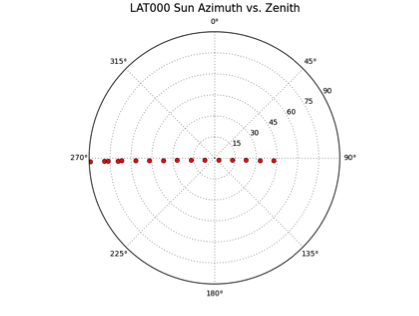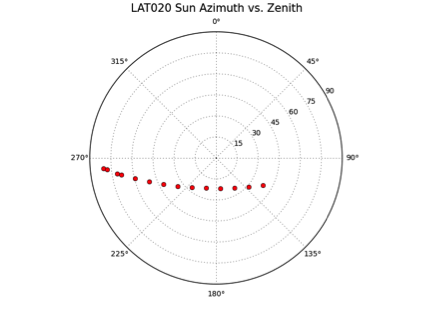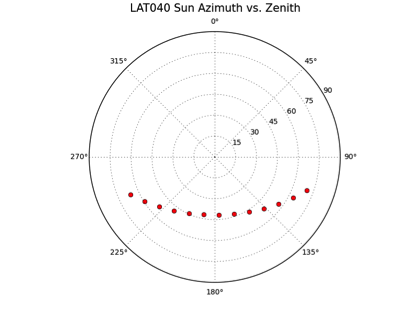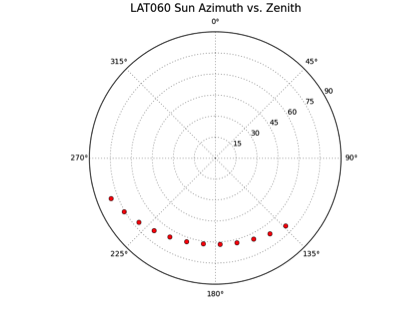|
Size: 6209
Comment:
|
Size: 6213
Comment:
|
| Deletions are marked like this. | Additions are marked like this. |
| Line 98: | Line 98: |
| ln -s lsupport/tile20_make_scriptT.in make_scriptT.in | ln -s lsupport/tile${gsd}_make_scriptT.in make_scriptT.in |
Test F3H - Latitude
Goal: Physical characteristics of the object. The maximum variation in sub-solar position is a function of the latitude of the TAG site. The higher in latitude the TAG site is, the lower quality the variations in Sun vector. Thus, we can get a better idea about how big this error is as we move to the polar regions.
Test Set Up
Data: Detailed Survey.
Start: 75cm Preliminary Survey Shape Model.
Build: Build TAG Site 1 for each Sub-Test, but using different images than standard. Because the shape model has different topography, we would not be able to build a TAG Site at each latitude and compare results -- RMS is strongly effected by variations in topography. As such, we will adjust the position of the Sun so that the images match the observing/illumination conditions that DS would have if TAG Site 1 was at different latitudes.
Sub-Test F3H-1 to F3H-9
For each Sub-Test, we start with the Preliminary Survey Shape Model. We build the topography using the Detailed Survey Images that are available at each latitude. Images will need to be generated with Bennu with the Sun position that cannot really exist. Either Bennu can be inclined by the needed number of degrees with the pole and date matching the summer solstist, or the SPOC has tools to generate images and SUMFILES for specific illumination geometries. The SPOC has conducted similar variations in illumination parameters so this is well understood. For this test, the SPOC would use Imager_MG to generate the images, which generated almost all of the images needed for Test F2-Calibration. The Test Engineer has compared the output of Freespace and Imager_MG and has determined that the variations between the two systems are not significant.
Details for Sub-Test F3H-1 to F3H-9:
Sub-Test |
Latitude |
Number of Images |
Emission Range |
Incidence Range |
F3H-1 |
0° |
TBD |
TBD |
TBD |
F3H-2 |
-8° |
TBD |
TBD |
TBD |
F3H-3 |
-20° |
TBD |
TBD |
TBD |
F3H-4 |
-30° |
TBD |
TBD |
TBD |
F3H-5 |
-40° |
TBD |
TBD |
TBD |
F3H-6 |
-50° |
TBD |
TBD |
TBD |
F3H-7 |
-60° |
TBD |
TBD |
TBD |
F3H-8 |
-70° |
TBD |
TBD |
TBD |
F3H-9 |
-80° |
TBD |
TBD |
TBD |
Evaluate:
- Relative Accuracy. Create truth models for each of the latitude TAG sties. Then compute the RMS deviation between the truth and the model.
Examples:




Directory Setup
Run from the F3H-Lat directory
0. Start typescript
script date pwd ls -l
1. Create Sub-Test directory
rsync --delete -ha orig/ test/
2. Add Sub-Test images
/SPC_Test/F3H-Lat/base/IMAGEFILES/ should already have all the images. We will control the images used by SPC via PICTLIST.TXT
Should also set up a PICTLIST.TXT for each sub-test and put it in lsupport/
2.1 User Input
testID=F3H-X
2.2 Copy and/or link files
cp registered_images/$testID/NOMINALS/* test/NOMINALS/ ls -l test/NOMINALS cp registered_images/$testID/SUMFILES/* test/SUMFILES/ ls -l test/SUMFILES rm test/PICTLIST.TXT ln -s lsupport/PICTLIST_$testID.TXT test/PICTLIST.TXT cat test/PICTLIST.TXT mkdir test/log
3. Tile at XXcm
3.1 User input
export gsd=XX #Enter ground sample distance in cm (ex. 20 for 20cm, 05 for 5cm)
3.2 Tile
cd test
rm LMRKLIST1.TXT
cat support/TILE${gsd}.in
ls -l /usr/local/bin/bigmap
/usr/local/bin/bigmap < support/TILE${gsd}.in | tee log-TILE${gsd}
echo "TILE${gsd}" | showmap
convert TILE20.pgm TILE${gsd}.jpg
cp TILE${gsd}.jpg ~/send/
rm MAPFILES/XXXXXX.MAP
ln -s TILE${gsd}.MAP MAPFILES/XXXXXX.MAP
rm make_scriptT.in
ln -s lsupport/tile${gsd}_make_scriptT.in make_scriptT.in
cat make_scriptT.in
make_scriptT
ls -l
cat INIT_LITHOS.TXT
lithos -v
nohup sh run_script.b &
#since this will take awhile
exit
#copy typescript file somewhere...
#when finished tiling
script
cd test
date
pwd
ls -l
find_nofitT
#fix landmarks
#after fixing, continue on
map_coverage
XXXXXX
0 .000XX # NEED TO REPLACE THE XX WITH THE GSD!
convert coverage_m.pgm coverage_m-TILE${gsd}-afterTiling.jpg
cp coverage_m-TILE${gsd}-afterTiling.jpg ~/send/
#Run this solo to make sure it works
mkdir log/TILE${gsd}
find_nofitT | tee log/TILE${gsd}/log-fit
sh support/logEvalP.sh
cat logResults.txt
cat lowImg.txt
cat redo.txt
cp *INN *OOT run_script*.b log/TILE${gsd}
# Clean directory
sh rem_script.b
rm TESTFILES/*
rm TESTFILES1/*
#copy typescript somewhere...
4. Iterate
4.1 Setup Iteration
script cd test date pwd ls -l cat support/TAG100.in ls -l /usr/local/bin/bigmap /usr/local/bin/bigmap < support/TAG100.in cp USED_MAPS.TXT LIST.TXT duplicates cat make_script.in ls -l /usr/local/bin/MAKE_LMRKLISTX MAKE_LMRKLISTX ln -s scripts/make_scriptP.seed make_scriptP.seed cat make_scriptP.seed make_scriptP | tee run.sh ls -l # Invoke batch iteration cat INIT_LITHOS.TXT lithosP -v nohup sh run.sh & #since this will take awhile exit #copy typescript file somewhere... #when finished iterating #clean landmarks script cd test date pwd ls -l # Check results find_nofitP | tee log-fitP sh support/logEvalP.sh cat logResults.txt cat lowImg.txt cat redo.txt # Fix uncorrelated images # Manual correlation as required
4.2 User input prior to saving
gsd=XX #Enter ground sample distance in cm (ex. 20 for 20cm, 05 for 5cm) Itnum=XX #Enter iteration number
4.3 Save files
#Save files
mkdir log/${gsd}cmIt${Itnum} #need to change XX as appropriate to gsd and iteration number
find_nofitP | tee log/${gsd}cmIt${Itnum}/log-fit
sh support/logEvalP.sh
cat logResults.txt
cat lowImg.txt
cat redo.txt
cp *INN *OOT run_script*.b log/${gsd}cmIt${Itnum}
# Clean directory
sh rem_script.b
rm TESTFILES/*
rm TESTFILES1/*
#copy typescript somewhere
5. Clean landmarks
Execute Block 7 - Clean
